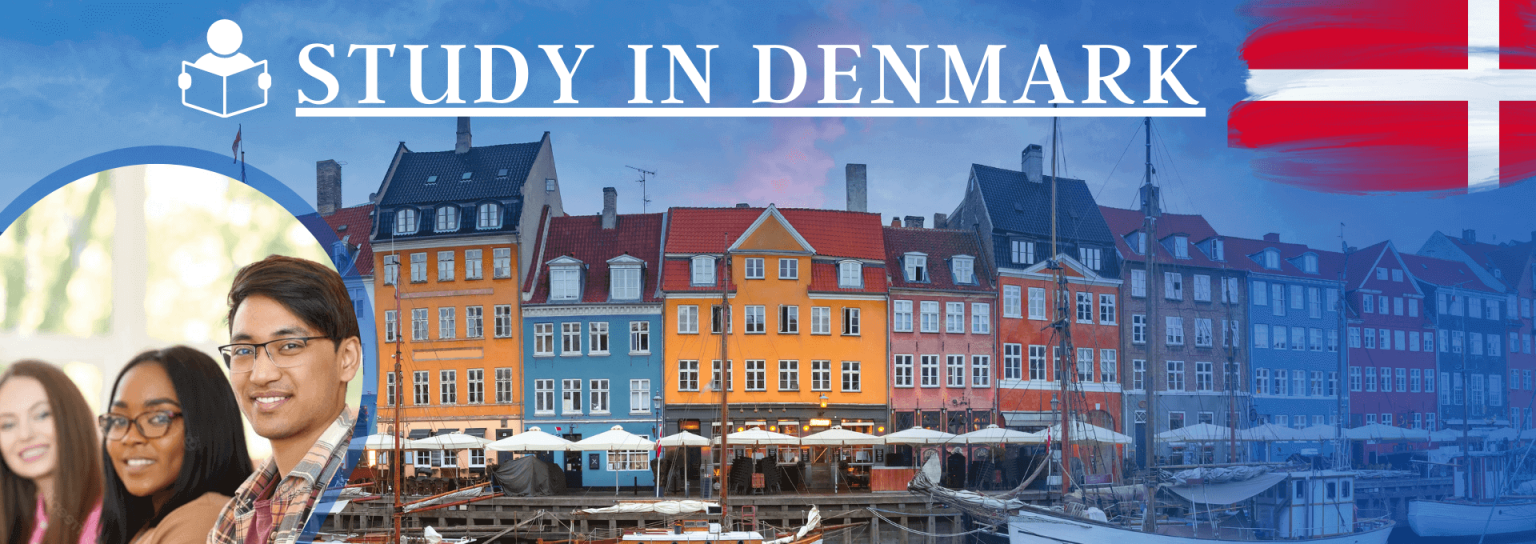Study in Denmark

ABOUT DENMARK:
Studying in Denmark for international students can be a fantastic way to develop new skills, accomplish your academic goals, and even learn a little more about yourself.
Denmark is one of the happiest places in the world, and it’s also brimming with excellent educational opportunities for those keen to pursue a specific interest.
Ranked as one of the best countries for quality of life, safety, job opportunities, and per capita income, an education in Denmark could even lead to a brand-new Nordic future some students.
Of course, the first step in unlocking all the benefits of Danish schooling, is figuring out how to start studying in Denmark as an international student.
Let’s cover some of the most important things you’ll need to know if you’re planning on studying in Denmark.
College in Denmark for international students
Denmark isn’t just a beautiful destination to visit, it’s also a fantastic environment for education. Between 2013 and 2017 alone, the number of international students in Denmark increased by more than 42%!.
Students love Denmark for its low fees, high-quality Master’s degrees, and innovative teaching methods.
Innovation is at the heart of the Danish culture, and local universities promote problem-based learning and personal initiative, allowing students to explore concepts in a far more interactive and engaging fashion.
International students also choose Denmark as their number one study destination because it gives them a chance to enjoy one of the most incredible locations on earth while earning their degree.
Operating according to the Nordic model, Denmark combines free market capitalism with generous programs for social welfare.
Though you won’t be able to study for free unless you’re an official Danish citizen, you can get a high-quality and globally-recognized degree for an extremely low price.
Who can go to college in Denmark?
Denmark is extremely welcoming to international students. However, it’s worth being prepared for a bit of a culture shock when you study abroad in Denmark. Most lectures are held in smaller groups rather than fully-packed halls, and the atmosphere is more laid back and friendly.
When you’re studying in Denmark, there’s also a good chance your school will have partnerships with research institutions and businesses, so you can gain practical scales and make connections which might lead to future job opportunities.
Danes know that while studying abroad is exciting, it can also be nerve wracking. This is why many of the universities operate using a buddy system, so you immediately get a friend to support and guide you when you arrive in the country.
All Top Danish Universities




WHY CHOOSE DENMARK – FROM A STUDENT PERSPECTIVE
As an international student in Denmark you can expect world-class education in areas such as engineering, life sciences, social sciences and IT. You will also be studying in a safe, friendly and innovation-driven environment.
In Denmark, higher education is focused on bringing about solutions for the real-world. Thus, traditional lectures are combined with industrial collaborations and teaching methods that promote students’ ability to use what they have learned and to turn new knowledge into innovative solutions.
This way of studying requires a high degree of personal initiative and independent thinking. If you choose to study in Denmark you will gain an international profile, excellent collaborative & innovative skill and a strong foundation for your future career.

INTAKES
August / September and January
DEADLINES
15 March – for Bachelors starting in August or September
1 September – Only a few institutions have additional intakes in January or February
However, for Masters the deadlines vary from university to university
PASSPORT VALIDITY REQUIREMENT
Passport should be valid for at least six months beyond your stay
LIVING COST
Denmark is an expensive country – but the standard of living is among the highest in the world. However, if you are sensible and follow local habits and economise – such as cycling to university and eating at home – life in Denmark should not blow your budget. However, expect to pay around 900 to 1200 Euros per month, depending on your own lifestyle.
AFTER STUDIES – SETTLEMENT OPTIONS
You can be granted a permanent residence permit in Denmark once you have had a temporary residence permit for eight years. In some cases the requirement is four years. In order to qualify for a permanent residence permit, the applicant needs to meet a number of basic requirements. You also need to meet at least two of four supplementary requirements. If you meet all four supplementary requirements, you will qualify for a permanent residence permit after having resided legally in Denmark for four years, rather than the normal eight.
Frequently asked Questions
It is required for Danish higher education institutions to create a Diploma Supplement in English to all students procuring a Danish degree. The supplement is created automatically and free of charge.
The Diploma Supplements is created along with your higher education diploma. It follows a format that makes it easier to equate your diploma internationally. The Diploma Supplement provides information on the nature, level, context, content and status based on your academic qualifications.
European Credit Transfer System (ECTS) is a method of calculation your study programme as academic currency. ECTS is used all over Europe and authorize you to easily equate study programmes and transfer your academic qualifications from one educational institution to another.
The use of ECTS points is mandatory in higher education in Europe. All Danish higher education programmes are narrated according to ECTS as a system for both credit transfer and academic credit accumulation towards the final degree
Danish Universities offer a limited number of scholarships that can be applied during the application process for a study programme.
Obviously, your dependents also accompany you.
IELTS is required minimum score is overall 6/6.5.
Talk to Our Best Career Counselors
